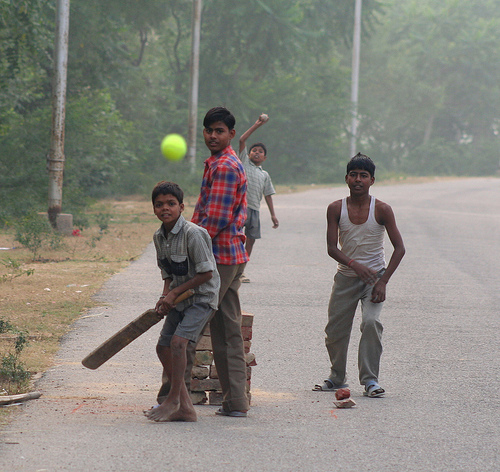One of the biggest constraints on kids’ learning is the teacher’s attitude. And one of the biggest things I see is “but these kids can’t do that!” Have you ever worked with teachers like that?
Today it happened with, of all themes, “Where are you from?” The excuses ranged from “but slum kids don’t have a concept of India never mind other countries” to “why teach things that the kids will never see?” The reason is, of course, to give a taste of other countries, which they’ll see anyway in sports tournaments, and for when they move onto projects.

Photo by foxypar4
I know that every time I’ve taught in classes in slum areas the kids know international cricket teams better than me with shouts of “West Indies!”, “Australia!”, “Sri Lanka!” dominating their talks. But today I had one teacher swearing me down that this wasn’t possible because no slum kids had TVs. “Yeah, but they have access to them” I replied. “No, not at all. There are no TVs there. My children are rich and watch TV so we can teach them this, with slum kids we can’t”.
Talk about taking a red rag to a bull! Apart from being very annoyed with the teacher, but not showing it of course, I was very confused as to why she would think this. Then I realised. Our private schools are actually in the slums. The teachers are often from there, get paid similar levels and know the kids very well. The government schools are outside the slums and as the teachers get paid so much more (sometimes as much as 10 times the private school teachers!) they probably never set foot there. Hence the stereotypes breed.
My usual response is to say “really?” then show a video of the kids actually doing what the teachers had just said was impossible! The video of the kids in the Doctor Doctor game and Colours game are all slum area schools.
But I didn’t have any for this particular theme. So I asked “What about this school? Is this a posh school?” to which they all replied “no!” So I popped outside, all the kids came up to say hello (something again some teachers thought was impossible!) so I said to them “My name is Richard. What’s your name?*” After a while they started saying their names (these kids haven’t done Genki English yet remember) then “I’m from England (plus a cricket sign!) Where are you from?*” to which after a few deliberations I got “India!”. Right, so they know the concept of a country!
(*this is the reason why we teach the full sentences in GE songs, so you can give the answer first to help the kids understand!)
So after a lecture as to why we are doing all this, why should only the rich kids learn? What’s different about the slum kids? Why can’t they have the same opportunity as everyone else? I finally got them back on side. Then they did the super herolesson and realised why we needed to learn “I’m from…”
Then after days of comments such as “you’ve ruined 25 years of my teaching with this workshop” and “I’m a government city teacher – I’m not doing this!” we had one lady ask to do a speech to the group once we’d finished. I really should have videod what she said because it was so moving, but it ended with them all saying “We PROMISE to try our best with this programme”.
And that for me, is everything I ask for.




It must be so much fun to teach these kids. They look so full of life and eager.
I like this article a lot.
Well, I don’t know much to say but Congratulations!!!
You did an amazing job.
Heard it so many times myself(my students can’t do that). Very frustrating. I need to take a lesson from you if you got that kind of feedback from the teachers in the end. As I have said before…you are inspiring. Your little bits of excitement are sometimes motivating me to go for another day.
I’m teaching to kids from three years old to twelve years old, So they have the same teacher from kindergarten to the end of Primary ( me ). My natural or native language is Spanish so, if I want my students learn English I have to plan my classes very well and I must to speak all the time in english and I must to motivate my student and of course, the best way of motivating them is using genki English (TPR).I bought it because I love it, my pupils have fun with it and they learn to comunicate in English with it.IT’S GREAT!
I’ve got students that don’t like to do homework or study, but when I use your worshop they learn your songs and they want to sing, dance. they are happy they ask me to draw the flags of their favourite countries. If they live in slams they need more teachers like you Richard, because when they are learning english in the same way you teach, they are having fun so they forget their problems.I would like to be you. This rich children don’t learn with their teachers, maybe they pay English classes.
Richard if I were you, I had said that my workshop haven’t ruined 25 years of her or his teaching,because she/he had only one year repeated 25.
Please go on with your training because we have to change the way of learning.
Thank you
I’m a bit late commenting but I had to reply.
You must find the attitude of some teachers so frustrating. I know I do. I think its fantastic what you’re doing in India.
Where I am, in Spain, teaching in general is very text based, even in first year primary. read, copy, complete, etc.. very little interraction or conversation.
I’ve found Genki English to be an excellent antidote. I’m constantly surprised by just how quickly kids will pick things up, adapt them and even suggest improvements.
I still get frustrated with some of the teachers though, English teachers who won’t or can’t speak English, in class or out.
All the best with your work in India. I’m sure the results will show your work to be very effective.